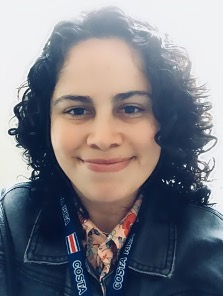
Hello! We are Adeyemo Adetogun, Onyinyechukwu Onwuka, and Grettel Arias Orozco, three international doctoral students from Nigeria and Costa Rica, and members of the STEM Program Evaluation Laboratory (SPEL) at UNC Greensboro (UNCG). We like to share with you some of our perspectives on multiculturalism as part of our research and evaluation assistantship in the Educational Research Methodology department.

Multiculturalism is broadly grounded in the “coexistence or juxtaposition” of two or more cultural groups of people. Multiculturalism shows up in our SPEL group where twenty-two members comprising 3 faculty, 11 graduates, and 8 undergraduate students have a rich cultural diversity in terms of race, ethnicity, gender, age, background, geographical location, etc. The SPEL group has a shared frame of reference regarding our epistemic beliefs rooted in social justice and equity, thus the language of research and evaluation discourse within the group is anchored on ensuring everyone feels comfortable and connected. As international students, we feel a sense of belonging to the group, and our participation in conversations and working in team tasks are valued. The prevailing atmospheric culture in the lab empowers our voices to be heard, our opinions matter, and work-related concerns receive sufficient attention.

The strength of multiculturalism within SPEL helps to frame how we negotiate and navigate our membership within the group. Our membership affords us the opportunities to continue to learn and gain cultural competencies needed for further development as evaluation scholars and practitioners. Conversely, SPEL presents us with a unique challenge as we grapple with occasional perceived unconscious and implicit bias when interacting with others. For us, multiculturalism is a prism through which we perceive and are perceived by others. The distillation of our different cultural backgrounds, orientation, and lived realities mold the substrate upon which we interrogate stereotypes that show up in our scholarship, graduate assistantship, and integration process while in SPEL.
Hot Tips:
Multiple and Intersecting Identities
- Having multiple and overlapping identities can be both empowering and oppressing within a group. To effectively navigate this dichotomy, group members are encouraged to continually have open conversations with colleagues during interactions, respecting boundaries, and acquire soft skills such as conflict resolution to have a healthy relationship among peers.
Practice Active Listening
- Participating in a multicultural group meeting online during the Covid-19 pandemic can sometimes feel challenging, requiring focus and adherence to prearranged etiquette. It is important to practice active listening in group discussion that stimulates multiculturalism because it strengthens the quality of mutual understanding, and attempts to demystify complex constructs embedded in issues of race and racism addressed in books like “How to be an antiracist,” (Kendi, 2019).
Dealing with Challenges of Multiculturalism
- Integration of team members with multicultural backgrounds can be challenging. Diverse forms of inefficient communication, misinterpretations, biases, prejudice, and stereotypes can arise along the way. Professional communication (respectful, clear, and transparent) should be pursued at all times to achieve understanding across different languages, cultures, and worldviews. Additionally, navigating multiculturalism means embracing the diversity of worldviews, working styles, expectations, and openness to various forms of knowledge.
Rad Resources:
- American Evaluation Association. (2011). Public statement on cultural competence in evaluation. Retrieved from https://www.eval.org/About/Competencies-Standards/Cutural-Competence-Statement
- Crenshaw, K. (1989). Demarginalizing the intersection of race and sex: A black feminist critique of antidiscrimination doctrine, feminist theory and antiracist politics. u. Chi. Legal f., 139.
- Kendi, I. X. (2019). How to be an antiracist. One world.
- Kirkhart, K. E. (1995). 1994 conference theme: Evaluation and social justice seeking multicultural validity: A postcard from the road. Evaluation practice, 16(1), 1-12.
- Mertens, D. M., & Wilson, A. T. (2018). Program evaluation theory and practice. Guilford Publications.
- Topornycky, J., & Golparian, S. (2016). Balancing openness and interpretation in active listening. Collected Essays on Learning and Teaching, 9, 175-184.
The American Evaluation Association is hosting STEM Program Evaluation Lab Week. The contributions all this week to aea365 come from evaluators working in this lab. Do you have questions, concerns, kudos, or content to extend this aea365 contribution? Please add them in the comments section for this post on the aea365 webpage so that we may enrich our community of practice. Would you like to submit an aea365 Tip? Please send a note of interest to aea365@eval.org. aea365 is sponsored by the American Evaluation Association and provides a Tip-a-Day by and for evaluators. The views and opinions expressed on the AEA365 blog are solely those of the original authors and other contributors. These views and opinions do not necessarily represent those of the American Evaluation Association, and/or any/all contributors to this site.
